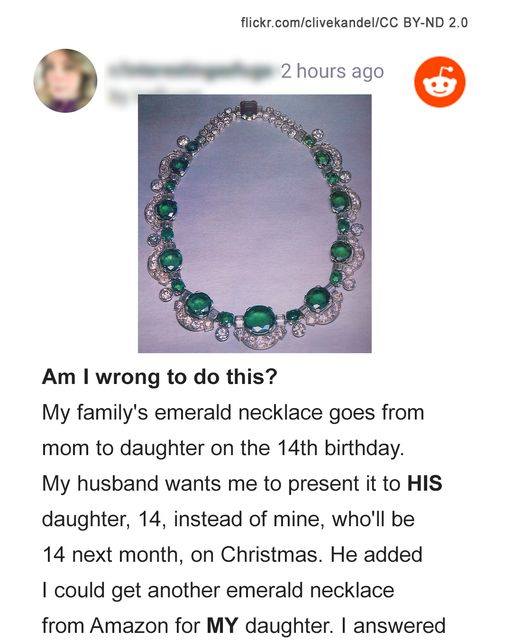A woman found herself in the middle of a difficult dilemma involving a precious family heirloom: an emerald necklace that had been passed down through generations and was traditionally gifted to the eldest child. This tradition held deep sentimental value and symbolized family continuity and cherished memories.
The woman had been married to Joey for two years and had a daughter named Emily from a previous relationship. She had planned to give the treasured necklace to Emily on her 14th birthday, following the longstanding tradition in her family. For her, it wasn’t just a gift—it was a meaningful gesture rooted in heritage.
However, things took a turn when Joey suggested giving the necklace to his daughter from a previous marriage, Sophia. He believed it would be a beautiful way to show Sophia that she was now truly part of their blended family, helping her feel included and accepted.
Emily, understandably upset, voiced her disapproval. She pointed out the importance of the tradition and how the necklace was a family keepsake that held personal significance. To her, this wasn’t about favoritism—it was about preserving a legacy that had always belonged to her family line.
Despite Emily’s feelings and the emotional weight of the necklace, Joey accused his wife of playing favorites. Feeling strongly about his stance, he involved his extended family, which only escalated the tension and made the situation even more emotionally charged.
Unsure of what to do, the woman turned to Reddit for advice, hoping to gain an unbiased perspective from others. She shared her story in hopes that someone could help her make the right decision in this emotionally complex situation.
Reddit users overwhelmingly supported her. Many criticized Joey’s suggestion, calling it unreasonable and unfair. They stressed that honoring a long-standing family tradition was not favoritism, but a respectful nod to her past and her family’s legacy.
According to the commenters, there were other, more thoughtful ways to make Sophia feel welcomed without taking away something that clearly belonged to Emily. They agreed that changing the tradition under pressure would be both hurtful and unjust.
This disagreement created a noticeable strain in their marriage, highlighting the real-life difficulties many blended families face. Conflicts between differing family histories, traditions, and expectations often arise—and resolving them requires empathy, communication, and respect.
In the end, the woman decided to give the necklace to Emily, choosing to honor her family’s tradition. With the support she received online, she felt reassured that her decision was fair, rooted in love and legacy—not exclusion or favoritism.
